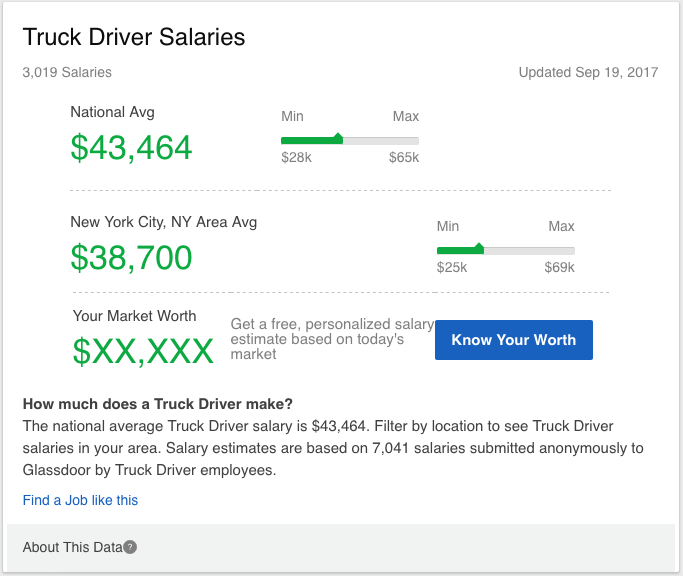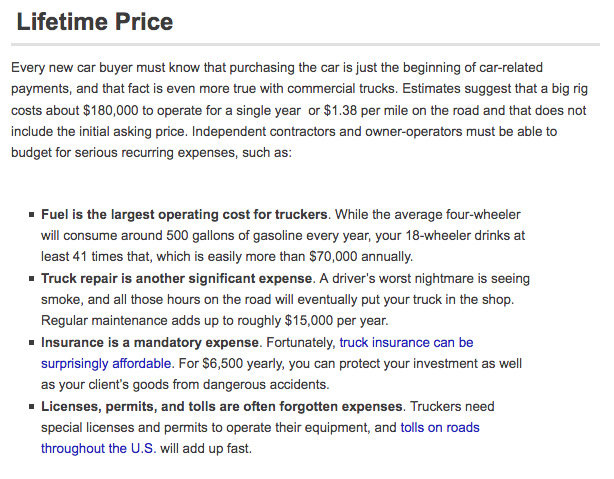Yes, it's part of an overall increase, but you're oversimplifying your statement a lot, like I did. Yes there has been an income increase, but you're missing the point. The point is that if you go the physician route you've got a minimum of 11 years of post-hs education and as many as 15 or 16 where you rack up that 200k+ in debt (sometimes 400k+) and have no income available to pay that back. Then you have to pay back your debt, so there's a bunch more of your income you're not saving or investing. In the mean time, UPS driver or whatever example you want to use is earning during that period. If you want to talk about it from an investment point, if an investor could pay 1,000-5,000 to start a business which will earn on average 60k/year for 50 years vs. the example you gave (which is incrorrect because they'd have to invest the $250k then wait 11-15 years to begin receiving any sort of payoff), it's just as good of an offer as they get paid right away and can then use their earnings to invest in other ventures.
I didn't miss any point. Your argument actually concedes my points. All you have done is re-describe the path to becoming a physician, as it has always been. So none of what you describe is a new circumstance, but your original post, that I bolded, argued that things are so much worse now. They are not worse, and using your own numbers only shows that they actually are better. I urge you to run these scenarios in Excel on a spreadsheet as I have done, and you will see exactly how quickly and easily physician's earnings overtake the debt load.
And residency should not be included in the period where debt accumulates. Average pay is over $50,000 now, so debt is not piling up for residents. I also don't think the bachelor's is fair to include. Your argument begins to take liberties in figuring its no big deal to skip all college education and simply start driving a truck right out of high school. We want to have a reasonable existence, not construct a hypothetical which is excessively spartan or consigned to privation. Not only this but you can't make a valid comparison to any other professions, because those are likely to require a bachelor's as well.
The chart is a huge oversimplification, as I said. However, according to the national data I've seen, physician salary actually doesn't increase across their careers. If I can find the report I will, but it showed that overall, physician salaries only increase until a doc is around 50, then their salary typically starts dropping off (I'm guessing because they start working less hours). Even if there is an increase in salary throughout their career, there's still the initial difference and an overall difference in terms of number of years in which each career is actually earning.
I don't really know what you're saying here. Physician pay increases over time, you admitted this when you said 25 years ago doctors made half what they make now. So, that incremental increase is going to apply to the docs out there doing work. On top of this, an employed doc may get actual raises, or a doc in a group will become partner and have a "business" component to his income like I suggested before.
Also I feel certain you are not running computations, because seriously, it would take me about eight minutes with a spreadsheet program and we would be done discussing the math part of this whole thing. And that's kind of the heart of this discussion, the math. You've got OB GYN making mid-$300,000, anesthetists, derm and rads around $400,000, and IM/FM at $220,000. Most of what I've discussed simply contemplates $200,000 a year with small increments reflecting the increasing value of physician services over time. The low numbers work just fine, let alone if you start talking about a specialty where you make half again as much or even double.
Yes, it is good debt in the sense that you can guarantee that it will be paid back and that you'll eventually make some great money. However, I would call a 7% interest rate far from good which can increase or be higher, especially if the gov sells your debt to someone else. This happened to my spouse and they company who bought her debt increased her interest to 10%. Sure, there's a lot of good aspects to it, but there are also negatives. And there are many risks to co-signers if you end up needing one to get the loans.
Your anecdote is highly suspect, with all due respect. The interest rate of a loan cannot be increased merely because the loan is sold. This is black letter law of contracts. If you re-financed to avoid default, you may have simply made a bad bargain. But the terms can't change, period, simply due to the debt instrument being conveyed to a third party. Whether a co-signer is at risk is irrelevant, of course they are, that's what co-signing means. But bottom line, student loan debt is statutorily outfitted with measures which make repayment easier and less burdensome. Is it just as good as not owing in the first place? No, of course not. But it is way better than owing a credit card company, or owing a bank mortgage where your home can be sold as security.
To the other points, this thread had nothing to do with job satisfaction, pleasure, social status or any of those issues, though they have been discussed ad nauseum on this forum. It's purely about the financial aspect. Sure the financial outlook is strong in the long run, but ignoring the pre-requisites and sacrifices required to get to that earning as well as the number of hours worked on average compared to most other careers makes.
Fine, but you are engaging in a false equivalency when you portray as equal the career of one who enlists in manual labor at age 18 with one who obtains a bachelor's degree and then gets involved in further education and training. These two lifestyles are not equal. I appreciate you admitting here that "in the long term" the physician earnings will justify the investment. I never argued there was not an investment period, and if you like the term "sacrifice" then fine, it is an investment of time and resources, in which some lean years are endured in order to achieve high earning potential.
But consider a quick example. In 22 years, a primary care doctor will likely earn over $5 million. In 35 years, the UPS driver will do well to earn $2.3 million. Yes, the doctor has to pay back his loan, OK, his earnings are back down to a mere $4.6 million. So the doc doubles up the driver in 13 fewer years. And this is without any interest being earned, in which case the doctor further outstrips the driver. There just is no comparison.
Please run your own scenarios using an Excel spreadsheet. This issue is just too simple and too mathematical to leave to "debate."
You also didn't refute other points I made, such as the unavailability of unlimited hours for the UPS driver, wear and tear on the UPS driver's body, potential of a doctor to buy into a practice or side business such as lab or imaging, and others. Many of these directly impact the financial discussion, and are not just trimmings or lifestyle considerations.
All of which is to say, the gloom and doom about how much it costs to be a physician is overblown. Costs have gone up for all education, but physician earnings have consistently increased year over year. Medical student loans can be handled, and non-income-producing years can be made up for, when you start earning average income of $200,000 a year. The sky is not falling.





